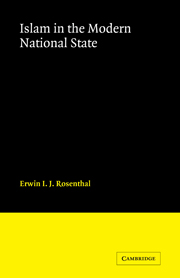Book contents
- Frontmatter
- Contents
- Introduction
- Acknowledgements
- Abbreviations
- Note on transliteration
- PART I CONTEMPORARY ISLAM IN CRISIS AND TRANSITION
- PART II ISLAM IN THE MODERN NATIONAL STATE
- SECTION I CONSTITUTIONAL ISSUES
- SECTION 2 CHANGES IN LAW AND THE EMANCIPATION OF WOMEN
- SECTION 3 THE PLACE OF ISLAM IN NATIONAL EDUCATION
- 14 Islam and Education in Pakistan
- 15 Islam and National Arabic Education in Tunisia and Morocco
- Epilogue
- Notes
- Select Bibliography
- Index
15 - Islam and National Arabic Education in Tunisia and Morocco
Published online by Cambridge University Press: 05 September 2013
- Frontmatter
- Contents
- Introduction
- Acknowledgements
- Abbreviations
- Note on transliteration
- PART I CONTEMPORARY ISLAM IN CRISIS AND TRANSITION
- PART II ISLAM IN THE MODERN NATIONAL STATE
- SECTION I CONSTITUTIONAL ISSUES
- SECTION 2 CHANGES IN LAW AND THE EMANCIPATION OF WOMEN
- SECTION 3 THE PLACE OF ISLAM IN NATIONAL EDUCATION
- 14 Islam and Education in Pakistan
- 15 Islam and National Arabic Education in Tunisia and Morocco
- Epilogue
- Notes
- Select Bibliography
- Index
Summary
In North Africa the situation is in some respects different. Islam is not only the official religion, it is also part of the Arab heritage and closely linked to the vigorously pursued policy of Arabisation in Tunisia and Morocco. Arabisation underlines the Arab character of nationalism; it is not only a question of language in that Arabic should everywhere replace French, the legacy of foreign imperialism, as soon as possible. It is also an acknowledgement of spiritual roots, a determination to make the Arab-Islamic patrimony the dominant component of the national culture of a free people, always stressing naturally the composite Maghribī civilisation to which Tunisia and Morocco are conscious heirs. Arabisation is considered as the vehicle to national unity; it also means the absorption of the large Berber element in the Tunisian and Moroccan nations, the replacement of the Bedouin tent by the stone house in a village settlement and the integration of the Berbers in the urban civilisation of the cities.
Islam plays an important role in this Arabisation, for Arabic literature is, as far as it is classical, imbued with religious ideas stemming from Islam, and contains the Islamic cultural heritage of the Middle Ages, including the transmission of Hellenic and Hellenistic culture and civilisation. Both countries profess in their constitutions their attachment to Islamic teachings, and it may very well be that Islam will be the principal, or at least an important, element in the cultural nationalism which must replace the political nationalism which culminated and was fulfilled in the attainment of sovereign independence.
- Type
- Chapter
- Information
- Islam in the Modern National State , pp. 362 - 372Publisher: Cambridge University PressPrint publication year: 1965



